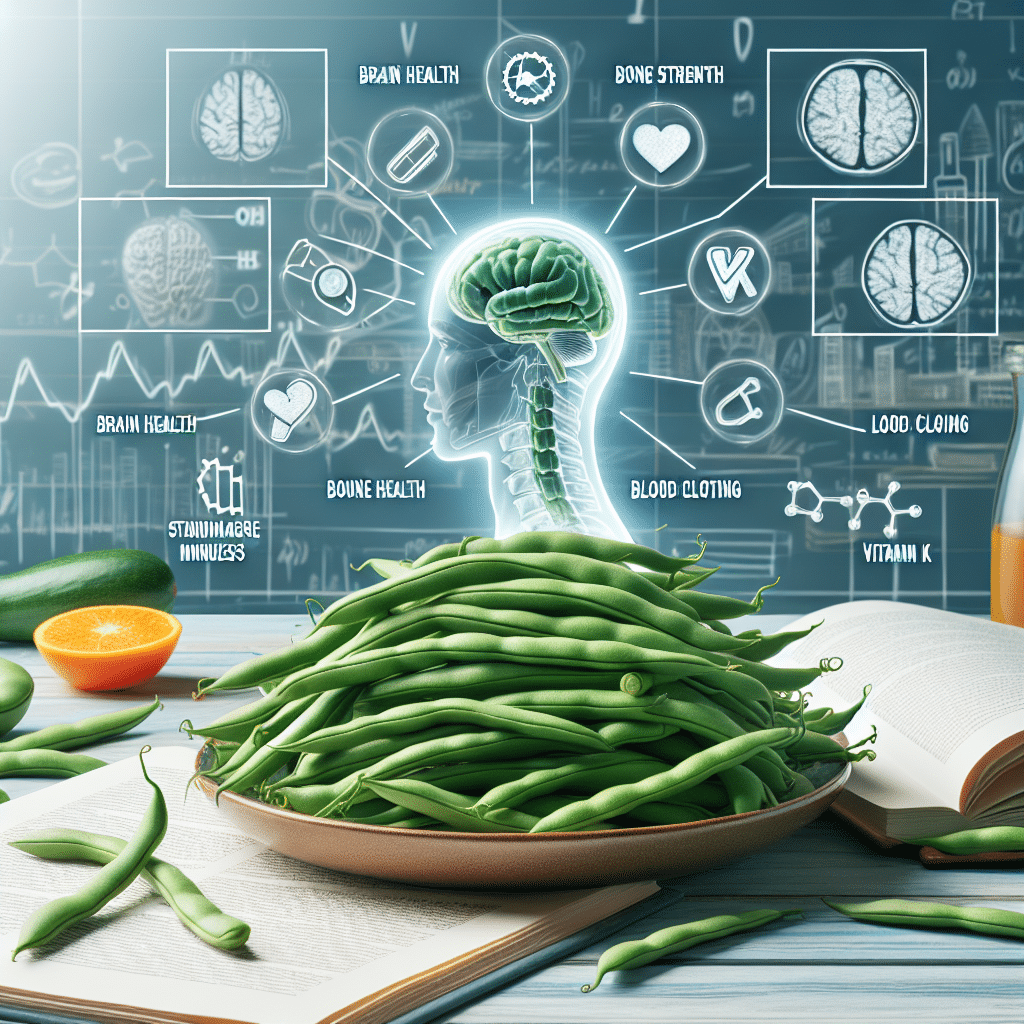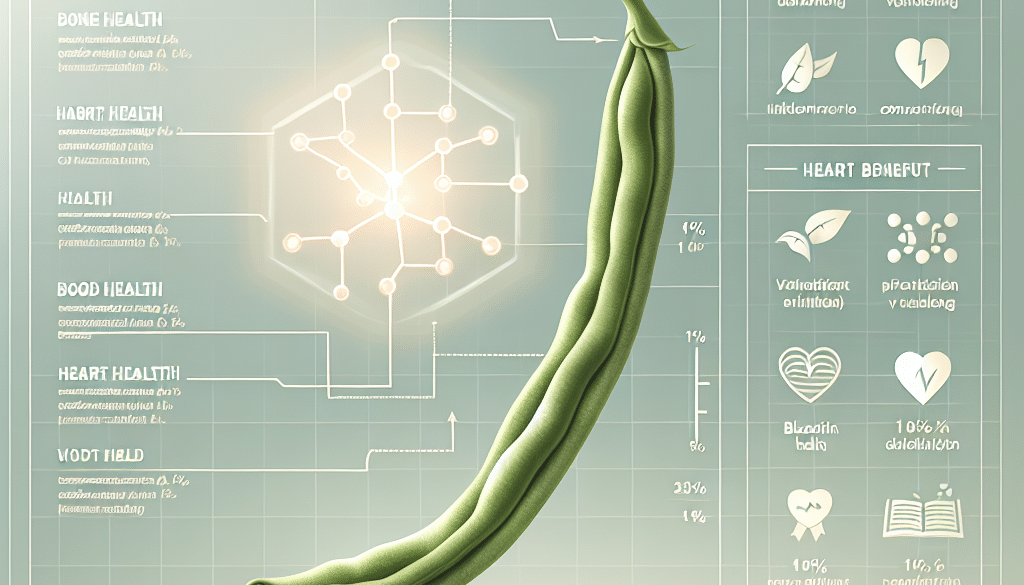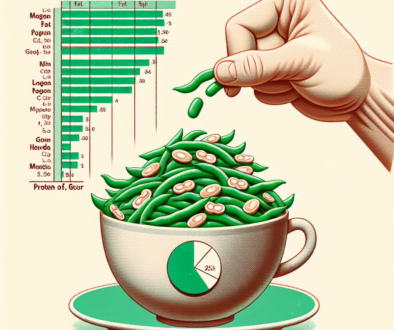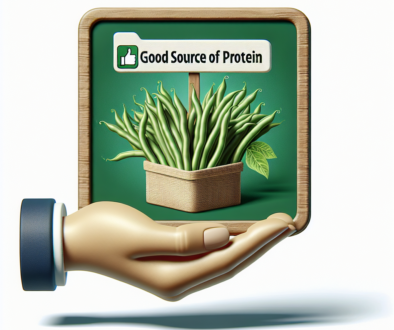Vitamin K in Green Beans: Health Implications
-
Table of Contents
- Vitamin K in Green Beans: Exploring Health Benefits and Nutritional Value
- Understanding Vitamin K
- Nutritional Profile of Green Beans
- Health Implications of Vitamin K in Green Beans
- Case Studies and Research on Vitamin K and Health
- Green Beans in the Diet: How to Maximize Vitamin K Intake
- Recommended Daily Intake and Safety Considerations
- Conclusion: The Significance of Vitamin K in Green Beans
- Discover ETprotein’s High-Quality Protein Products
Vitamin K in Green Beans: Exploring Health Benefits and Nutritional Value

Vitamin K is a crucial nutrient that plays a vital role in many bodily functions, including blood clotting, bone metabolism, and regulating blood calcium levels. Green beans, a common vegetable found in many diets around the world, are not only delicious and versatile but also a valuable source of this essential vitamin. In this article, we will delve into the health implications of vitamin K in green beans, supported by scientific research, case studies, and statistics.
Understanding Vitamin K
Vitamin K refers to a group of fat-soluble vitamins that are key players in maintaining optimal health. There are two main forms of vitamin K: K1 (phylloquinone), which is found in plant-based foods like green vegetables, and K2 (menaquinone), which is found in animal-based foods and fermented products. Vitamin K is essential for the synthesis of proteins that mediate blood clotting and bone formation.
Nutritional Profile of Green Beans
Green beans, also known as string beans or snap beans, are a rich source of vitamins, minerals, and dietary fiber. They are low in calories and fat, making them an excellent addition to a healthy diet. One of the key nutrients found in green beans is vitamin K1. A 100-gram serving of cooked green beans contains about 14.4 micrograms of vitamin K, which is about 12% of the daily recommended intake for adults.
Health Implications of Vitamin K in Green Beans
The presence of vitamin K in green beans has several health implications, which include:
- Bone Health: Vitamin K is essential for bone health as it helps in the carboxylation of osteocalcin, a protein that binds calcium to bones. Adequate intake of vitamin K can help prevent osteoporosis and fractures.
- Cardiovascular Health: Vitamin K can help prevent calcification of arteries and other soft tissues, which is a risk factor for cardiovascular diseases.
- Blood Clotting: As a key factor in the blood clotting process, vitamin K ensures that bleeding is stopped effectively after an injury.
- Cognitive Health: Emerging research suggests that vitamin K may have a role in maintaining brain health and cognitive functions.
Case Studies and Research on Vitamin K and Health
Several studies have highlighted the importance of vitamin K in disease prevention and health maintenance. For instance, a study published in the “Journal of Nutrition” found that higher vitamin K intake was associated with a lower risk of hip fractures in women. Another study in the “American Journal of Clinical Nutrition” linked adequate vitamin K levels to improved cardiovascular health.
Research also suggests that vitamin K may have anti-inflammatory properties, which could be beneficial in conditions like arthritis. A study in the “Journal of the American Dietetic Association” found that increased vitamin K intake was associated with reduced inflammation markers in patients with osteoarthritis.
Green Beans in the Diet: How to Maximize Vitamin K Intake
Incorporating green beans into your diet is an easy and tasty way to boost your vitamin K intake. Here are some tips:
- Steam or sauté green beans to preserve their vitamin K content, as opposed to boiling, which can lead to nutrient loss.
- Pair green beans with healthy fats like olive oil or nuts to enhance the absorption of vitamin K, which is fat-soluble.
- Include a variety of green vegetables in your diet to ensure a good mix of nutrients, including different forms of vitamin K.
Recommended Daily Intake and Safety Considerations
The recommended daily intake of vitamin K varies by age, gender, and life stage. For adults, the adequate intake is set at 90 micrograms per day for women and 120 micrograms per day for men. While vitamin K is generally considered safe, individuals taking blood-thinning medications should manage their vitamin K intake under medical supervision to avoid interactions.
Conclusion: The Significance of Vitamin K in Green Beans
In conclusion, green beans are a nutritious vegetable that can contribute significantly to your daily vitamin K intake. The health benefits of vitamin K, including its role in bone health, cardiovascular health, blood clotting, and potentially cognitive function, make it an essential nutrient for overall well-being. By incorporating green beans into a balanced diet, you can enjoy these health benefits while savoring a delicious and versatile vegetable.
Discover ETprotein’s High-Quality Protein Products
For those looking to complement their healthy diet with additional protein sources, ETprotein offers a range of organic bulk vegan protein and plant proteins. Their products, including Organic rice protein, clear rice protein, pea protein, clear pea protein, pumpkin seed protein, sunflower seed protein, mung bean protein, and more, are characterized by a neutral taste and are non-GMO and allergen-free.
ETprotein caters to a diverse range of industries, including nutraceuticals, pharmaceuticals, cosmeceuticals, veterinary, as well as food and beverage finished product distributors, traders, and manufacturers across the globe. With a specialization in exporting and delivering tailor-made protein powder and finished nutritional supplements, ETprotein is a trusted company by leading global food and beverage brands and Fortune 500 companies.
For more information or to sample their products, please contact ETprotein and email sales(at)ETprotein.com today.
About ETprotein:
ETprotein, a reputable protein Chinese factory manufacturer and supplier, is renowned for producing, stocking, exporting, and delivering the highest quality organic bulk vegan protein and plant proteins. They include Organic rice protein, clear rice protein, pea protein, clear pea protein, pumpkin seed protein, sunflower seed protein, mung bean protein, etc. Their offerings, characterized by a neutral taste, non-GMO, allergen-free attributes, cater to a diverse range of industries. They serve nutraceutical, pharmaceutical, cosmeceutical, veterinary, as well as food and beverage finished product distributors, traders, and manufacturers across Europe, USA, Canada, Australia, Thailand, Japan, Korea, Brazil, and Chile, among others.
ETprotein specialization includes exporting and delivering tailor-made protein powder and finished nutritional supplements. Their extensive product range covers sectors like Food and Beverage, Sports Nutrition, Weight Management, Dietary Supplements, Health and Wellness Products, and Infant Formula, ensuring comprehensive solutions to meet all your protein needs.
As a trusted company by leading global food and beverage brands and Fortune 500 companies, ETprotein reinforces China’s reputation in the global arena. For more information or to sample their products, please contact them and email sales(at)ETprotein.com today.












